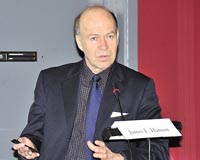| . |  |
. |
Washington (AFP) May 12, 2010 US senators vowed Wednesday to revamp US energy priorities as they laid out a long-awaited plan to fight climate change, but they faced a tough battle ahead to sell a delicate compromise. The legislation comes in the shadow of a giant oil spill in the Gulf of Mexico, which led the senators to offer greater ecological protections for offshore drilling -- one of the most controversial parts of the package. Senator John Kerry, the main force behind the effort, said the bill would put a price on carbon -- blamed for global warming -- and in the process change US energy consumption patterns and create "millions" of new green jobs. "It's a message to the world that America is ready to take back our role as the world's clean energy leader," Kerry, a close ally of President Barack Obama, told a packed news conference flanked by industry supporters. "Washington is watching as other countries take jobs from us -- literally steal them from us -- while we know those are jobs that could belong to American workers." Senator Joe Lieberman, who joined Kerry on the bill, said that a new energy policy would improve US security by depriving "enemies of America" like Iran and Venezuela of oil revenue. "The challenges that we face today are clear and so are the choices we have. We can lead or we can be led. We can grow or we can shrink," Lieberman said. A Senate aide estimated that the plan would reduce US dependence on the OPEC oil cartel by 34 percent by 2050 by funding alternative transport and energy, including offering tax incentives for trucks to use clean natural gas. The climate debate in the world's largest economy is being closely watched abroad as negotiations languish on a new international climate treaty. The United States was the only major industrial power to snub the Kyoto Protocol, whose obligations to cut emissions expire at the end of 2012. The bill threatens to slap tariffs on goods from nations that fail to cut carbon emissions if negotiations on a post-Kyoto treaty collapse. The senators' plan would cut US carbon emissions by 17 percent by 2020 from 2005 levels, going up to 83 percent by 2050. The House of Representatives set similar goals when it passed its own bill in June last year. With the political climate shifting, senators had balked at introducing their own bill, brushing aside pressure to act before the tense climate summit in Copenhagen last December. Obama, who has made energy a top priority after his successful push to reform health care, urged the Senate to act this year. "For too long, Washington has kicked this challenge to the next generation. This time, the status quo is no longer acceptable to Americans," Obama said. While shying away from the politically charged term, the Senate bill in effect sets up a "cap-and-trade" system that limits carbon emissions by businesses but gives them an economic incentive by allowing trade in credits. Mindful of the uncertain economy, the bill requires no emission curbs by manufacturers until 2016, exempts farmers and small businesses entirely and promises that revenue generated be returned to consumers. Some Republicans bristled at what they consider social engineering to reduce the US appetite for gasoline. "Whatever its intentions, this bill is little more than a job-killing national energy tax," said Senator Mitch McConnell, the top Republican in the chamber. In hopes of winning support from industry and Republicans, Kerry introduced ideas deeply unpopular with environmentalists including offshore drilling, nuclear power and research to develop "clean coal." In the wake of the Gulf of Mexico oil leak, the proposal was changed to allow states to opt out of drilling up to 75 miles (120 kilometers) off their shores -- well beyond the current range of a few miles. The proposal would allow states to make a case to stop offshore drilling from a nearby state. It would also give each state 37.5 percent of drilling revenue; under current policy, it all goes to Washington. While many environmentalists praised the bill, some believe it is too watered down. The US emission reduction goals are already well below those approved by the European Union and proposed by Japan. James Hansen, the director of NASA's Goddard Institute for Space Studies who was speaking in a personal capacity, said on a visit to Paris that the bill was "worse than no bill at all." "They have got 2,000 pages of giveaways so they will make very little reductions in emissions," Hansen said.
Share This Article With Planet Earth
Related Links Climate Science News - Modeling, Mitigation Adaptation
 'Climate dice' now dangerously loaded: leading scientist
'Climate dice' now dangerously loaded: leading scientistParis (AFP) May 12, 2010 Evidence for global warming has mounted but public awareness of the threat has shrunk, due to a cold northern winter and finger-pointing at the UN's climate experts, a top scientist warned Wednesday. James Hansen, a leading NASA scientist whose testimony to the US Congress in 1988 was a landmark in the history of climate change, said he was worried by "the large gap" in knowledge between spe ... read more |
|
| The content herein, unless otherwise known to be public domain, are Copyright 1995-2010 - SpaceDaily. AFP and UPI Wire Stories are copyright Agence France-Presse and United Press International. ESA Portal Reports are copyright European Space Agency. All NASA sourced material is public domain. Additional copyrights may apply in whole or part to other bona fide parties. Advertising does not imply endorsement,agreement or approval of any opinions, statements or information provided by SpaceDaily on any Web page published or hosted by SpaceDaily. Privacy Statement |